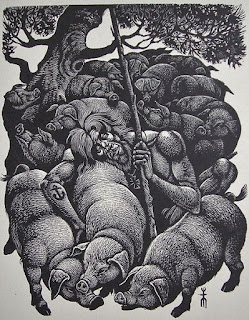August Trinity
Luke
18, 35-43
 It happened as he approached
Jericho: a certain blind man was sitting by the road begging. Hearing the crowd
going by, he wanted to know what was happening, and they told him Jesus of
Nazareth was passing by. He cried out in a loud voice: “Jesus, Son of David,
have mercy on me!”
It happened as he approached
Jericho: a certain blind man was sitting by the road begging. Hearing the crowd
going by, he wanted to know what was happening, and they told him Jesus of
Nazareth was passing by. He cried out in a loud voice: “Jesus, Son of David,
have mercy on me!”
Those
leading the way threatened him and wanted him to be quiet. But he cried all the
louder, “Son of David, have mercy on me!”
Jesus
stopped and had him led to him. And Jesus said to him, “What do you want that I
should do for you?”
He
said to him, “Lord, that I may look up and see again.”
And
Jesus said to him, “Receive your sight. Through your faith and your trust, the
power for healing has been awakened in you.” ( your faith has healed you)
In that
moment his eyes were opened. He followed Him and thus revealed the working of
the divine within the human being--and all who saw it praised God.
4th August Trinity 2019
Luke 18: 35 – 43
Imagine only being able to look downward, to see only the
ground under your feet. Certainly, there are small miracles there—the beauty of
sand grains or green grass. But looking up, elevating our gaze, opens up whole
worlds. We can take in the majesty of mountains, the ever-transforming sky, the
magnificence of the stars. We can perceive the wonders of all our fellow
creatures.
Whole levels of meaning emerge.
 |
| Brian Jekel |
The blind man asks Christ to help him look up and see again.
He wants to elevate his gaze, to take in the expanse of the universe, to
experience new levels of meaning. And Christ tells him that because he trusts
that this is possible, the power to enlarge his vision is already operating in
him, is already elevating his gaze. His openness allows him to receive his
sight.
In a sense, we are all blind. Yet the ability to see is an
indwelling capacity given to us by God, a capacity we can further cultivate. It
is partly a matter of ignoring those inner and outer voices which would squelch
our attempts to elevate our gaze. And it is a matter of trusting that it is
possible, and listening for the Voice that says to trust the power to heal our inner
blindness, to raise our gaze upward.
And ultimately, when our eyes open and our gaze rises, we
encounter the One speaking to us, the One who helps us heal, the One who gave
us our sight.
And in the words of the poet He tells us to look at the true
yet commonplace miracles:
…a small and airy cloud
is able to upstage the massive moon.
is able to upstage the massive moon.
...
A miracle, just take a look
around:
the inescapable earth.
the inescapable earth.
An extra miracle, extra and
ordinary:
the unthinkable can be thought.*
the unthinkable can be thought.*
























